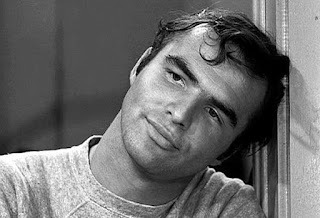Today, film icon Burt Reynolds passed away. Known for a tumultuous career with considerable peaks and valleys, there was a time when he ruled the box office with his country charm and mischevious antics. While he will probably always be best known for comedic gems like
The Longest Yard or
Smokey and the Bandit, one can't overlook his more serious work in powerful films like his breakthrough role in
Deliverance or his big comeback decades later in
Boogie Nights. Given that I hit the scene in 1978 and Burt's greatest success came during the late 70s and extended into the early 80s, he was no stranger in my household. I grew up in the foothills of the Appalachian mountains, knee-deep in moonshine country, so two of his lesser-known pictures were particular favorites. I still consider
White Lightning (1973) and
Gator (1976) to be his best work, even if the sequel is not nearly as potent. In light of Burt's demise, I thought I would share my thoughts on these southern thrillers with you here.
Burt Reynolds Salute - White Lightning (1973)
White Lighting is a revenge thriller with some serious deep south flair, and it all hinges on a layered performance from Reynolds. He plays "Gator" McClusky, a hotshot moonshine runner who is cooling his heels in the joint when his little brother is murdered by a sadistic sheriff. Set on vengeance, Gator mounts a reckless escape attempt that ultimately fails. Without any other means of getting revenge at his disposal, he decides to turn informant for the feds and shake down the corrupt lawman responsible for his brother's death. This gives the film more weight than one might expect from this genre, as there isn't much of anything so reviled in the film's setting as a federal informant, regardless of his intentions. Making matters worse, Sheriff J.C. Connors (Ned Beatty) is no pattycake, and if Gator intends to take this cold-blooded killer with a badge down, he has his work cut out for him. The picture is moody and deliberate at times, but it also sports a lot of rip-roaring thrills, with some five star car chases highlighting the excitement. There's also room for a couple of brawls, and Reynolds gets to show his comedic side as well as his action chops, so there are some big laughs in play as well. There are even some heavy dramatic beats, and Reynolds never falters in the lead role. Director Joseph Sargent does a splendid job, and he makes great use of his budget and the gothic trappings of the film's setting. This one is part drive-in flick and part film noir, and Burt was at the peak of his powers, elevating the proceedings at every turn. Beatty was also doing great work at this point, and here they are assisted by stellar players like Diane Ladd, Bo Hopkins, Matt Clark, and R.G. Armstrong along the way. This is a picture that I like to revisit, and I am always struck by its depth; it is incredibly dark at times, and it also bursting with warmth in places, mostly due to Burt's unmistakable charisma. It is never dull, and it remains incredibly unique all these years later. Some would label
White Lightning a sleeper hit, but I have never hailed it as anything less than an American classic. Thank you, Burt.
Final Grade: A+
 |
| Yes, he was famous for his "aw shucks" demeanor and that sly grin, but White Lightning was one of many vessels that also benefited from his considerable range and his simmering intensity. |
Burt Reynolds Salute - Gator (1976)
Reynolds made his directorial debut with this sequel, a lighter and lesser affair that still offers up boatloads of fun. Honestly, the best decision Reynolds made when making this lean romp was casting Jerry Reed as the heavy. As Bama, Reed plays a sleazy villain who is really just trying to be a good friend. During a lifetime of crime, he has grown so corrupt that he doesn't realize just how revolting some aspects of his lifestyle are. He thinks he is helping Gator out by ingratiating his old buddy into his sordid lifestyle, and it is this bizarre relationship and Reed's red-hot performance that steal the show--and stealing the show in a Burt Reynolds picture couldn't have been an easy task, much less with Burt in the director's chair! Oh, and before I go any further, it has to be said that Reed's title song is 100% badass and it helps to start the film on a major high note. Yes,
Gator is a retread in a lot of ways, and it is streamlined for maximum entertainment value, robbing it of its predecessor's depth. Of course, it still manages to put some compelling material on screen, and even if Reed is given a richer part and nails it, Burt is also on fire. Most importantly, even if the movie stumbles here and there, and feels more than a little derivative, it damn near atones for all of its sins during a rousing conclusion. The big finale consists of a nifty cat-and-mouse sequence at a motel followed by an epic brawl where Reynolds and Reed throw down on the beach.
Gator isn't on the same level as
White Lightning, but it is a rousing picture that serves as a nice continuation for the title character.
Final Grade: C+
 |
| While vastly inferior to White Lightning, Gator benefits from a dynamic relationship between Burt's wily hero and Jerry Reed's sleazy villain. |
























































